Just as it takes a village to raise a child, it also takes a village to support a new mother.
While our parent’s and grandparent’s generation relied primarily upon family and neighbours, millennial mothers are typically part of one or more “mom groups”. Whether on social media, through local meet-ups or community centres, these groups exist to provide mom-to-mom companionship through the ongoing challenges and triumphs of motherhood.
World Vision teamed up with the World Food Programme to organize a mom group in South Sudan to teach mothers–including pregnant and breastfeeding moms–how to cook, improve nutrition and practice good hygiene. Arek was one of these mothers.
“We had a variety of meat and vegetables but didn’t know how to cook them together to make a balanced diet,” says the 24-year-old mom after attending a cooking demonstration. “I’ve learned that I can combine posho (maize flour) or sorghum (grains), chicken and lentils to whip up a nutritious meal for my family.”
 These mothers are learning how to use simple, affordable homegrown goods to feed their families nutritious meals.
These mothers are learning how to use simple, affordable homegrown goods to feed their families nutritious meals.
When Arek first joined the group, her 17-month-old son was suffering from malnutrition. Through the group, the toddler was given CSB++, an intensive meal treatment for children. “My son recovered [within a month] when I fed him the porridge,” Arek says.
After three months of meeting twice a week, Arek was selected to become the group leader. She says she’s grown to admire her fellow mothers.
Of course, COVID-19 makes things more challenging, but a mother’s needs don’t stop. Recent demonstrations, including handwashing and learning sessions about the pandemic and how to prevent the spread of the virus, were held with safety precautions in place.
Like any new insight gleaned from a mom group, mothers are often inspired to share their new knowledge with fellow moms. Before long, for every woman in the group, 10-15 more women in the Gorgrial East County were learning how to properly wash their hands, cook balanced meals and grow their own food.

Mom groups have been a monumental success by empowering these women to not only prepare meals in their homes, but to reduce malnutrition cases in their children and involve their partners in household duties.
Men in the community have also been participating in demonstrations, slowly breaking down social barriers by helping their wives in the kitchen and with childcare responsibilities. “Through working with male change agents in our communities, some perceptions are gradually changing,” Arek explains. “My husband now helps me with the chores, takes care of our child, and helps me when I’m busy.”
With the support of donations like yours, mothers like Arek—and the families who rely upon them—are empowered to make healthy, sustainable changes.